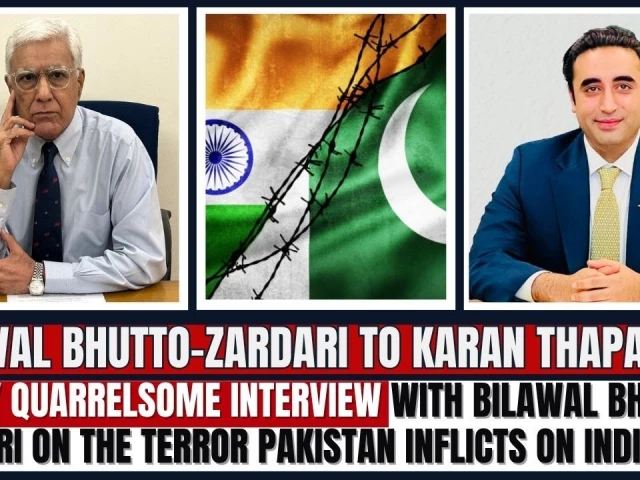Pakistan Peoples Party (PPP) President Bilawal Bhutto Zardari on Wednesday called on the population of India to avoid falling prey for “disinformation and hate monging”, emphasizing that it was easy for the current generation to talk about war.
In an interview with Indian journalist Karan Thapar, former Pakistani Foreign Minister categorically rejected India’s claims of the country’s involvement in any terrorist acts and termed such claims a pure propaganda.
“I just want to tell the people of India that they should be, they should avoid disinformation and hate Mongers. It is easy for this generation to talk about war and tell you that any Pakistani is a terrorist, every Pakistani is your enemy; it is not true,” he said.
“Pakistan does not allow willing groups you have mentioned, or any group to carry out terrorist attacks outside Pakistan, but also in Pakistan. We have, as you realize, faced terrorism for the past several decades. Pakistan is and has fought for the greatest inner war against terrorism.”
While expanding the question of terrorism in the country, the PPP chairman remembered the huge toll the people suffered. “We have lost 92,000 lives completely. Just last year we lost more than 1,200 civilian lives in over 200 different terrorist attacks.”
The PPP chief warned that the current rate on which terrorist attacks took place in different parts of the country this year, “If they continue at this pace, it will be the bloodiest year in Pakistan’s history”.
Bilawal recognized the emotional costs of terrorism and said, “I am also a victim of terrorism. I feel the pain of the victims of Pahagam -Terroric attacks. I understand the trauma that their families experience in a way that more than many others can ever imagine.”
About Pakistan’s efforts to fight terrorism, he noticed the military actions taken in South Waziristan and later in North Waziristan over the years. “Most recently, we underwent a strict FATF process with the international community that supports Pakistan’s actions against the said terrorist groups,” he said. Bilawal emphasized that the Task Force for the financial action was a very strict process that had a complete surveillance mechanism. “So it’s not like you can hide from it,” he said, adding, “We implemented a national action plan as far as our actions against the worship groups for India.”
Bilawal repeated Pakistan’s offer of an international probe in the Pahagam attack in the Indian illegally occupied Jammu and Kashmir (IIOJK), where 26 tourists were killed on April 22. The incident also triggered a four-day military escalation with Pakistan from 7-10.
“Immediately after this accusation from the Indian government, Pakistan’s prime minister declared publicly that Pakistan is willing to be part of any impartial international investigation into the incident because our hands are pure.” However, he added that India rejected the offer.
He emphasized the need for cooperation between Pakistan and India on terrorism and said, “I would like to see the day that India and Pakistan participate in extensive dialogue, which should also include the question of terrorism so that we can collectively fight this threat.”
The PPP chairman remembered the Samjhota Express attack in 2007, when dozens of Pakistani citizens lost their lives on the Indian earth and questioned why there had been no conviction. “We can’t ignore Safran Terror on one side and then have another standard on which Pakistan is judged,” he said.
He highlighted India’s role in promoting terrorism in Pakistan and referring to the case of Kulbhushan Jadhav, an Indian spy arrested in Balochistan. “Recently, the Jaffar Express attack can directly link to facilitators in your intelligence agency,” he told the interviewer.
Bilawal also raised concerns about India’s plans to cut water supplies to Pakistan and call Delhi’s decision to keep the Indus water Treaty in violation as a violation of humanitarian principles.
“The Indian Prime Minister and your government threaten to cut off the water supply to 240 million people in Pakistan. This goes against all it is to be Indian. It goes against Gandhi’s philosophy. It goes against everything we have learned about a secular India.”
Bilawal, who last month led a parliamentary delegation to several world capitals on a mission to debunk the Indian propaganda in the wake of the recent conflict, said Operation Bunyanum Marsoos was launched as an answer to Indian aggression.
Despite these challenges, he repeated Pakistan’s desire for peace. “We want peace. We can talk together and sort all our problems,” he concluded.
This was the first interview of a Pakistani politician of any Indian media output. In a tweet on X, Bilawal explained that he believed in the people of India, especially the youth, and he was not afraid to put “our case to the Indian public” via Indian media.
“I chose to give an interview to Indian media, not because I was expecting a fair platform, but because I believe in the people of India, especially youth.
We want to be the generation that breaks the spring’s spring that is trosing the war mounts, the cynics and the hatred of the hatred. Together we will face the real challenges of our time together, from terrorism to climate change to inequality. This is my promise to the young people of peace and Pakistan: Our future will be defined not in the conflicts in the past, but a new death of peace of peace taught, in terms of cooperation, by cooperating, by being a new death of peace. and prosperity. “



